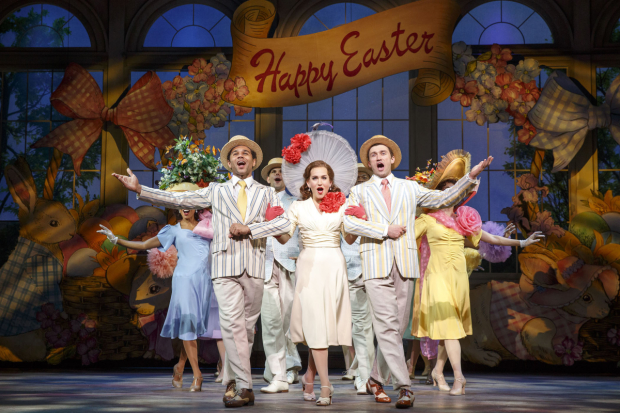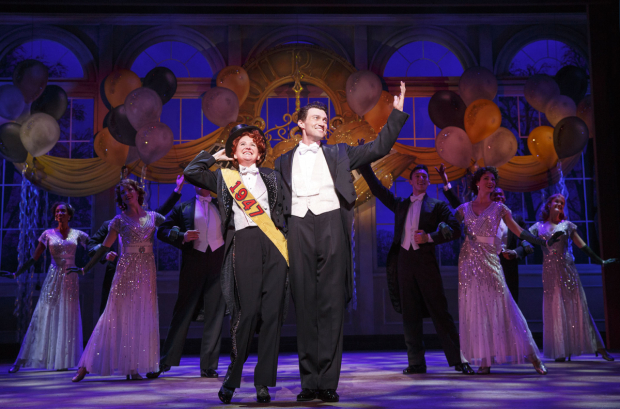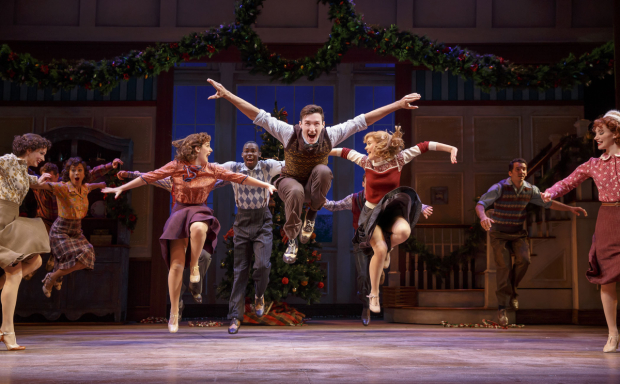Holiday Inn
Bryce Pinkham and Corbin Bleu take the stage in this “New Irving Berlin Musical” at Studio 54.

(© Joan Marcus)
The word "new" is in the title, but Holiday Inn, the New Irving Berlin Musical at Studio 54 is a decidedly old-fashioned affair. The music is a veritable hit parade of songs that have been around for 75 years; the backstage scenario is just as timeworn; and the show itself, directed by Gordon Greenberg and cowritten by Greenberg and Chad Hodge, harks back to the Golden Age, when glitz was more important than dramatic tension. Even though the authors have tried to insert some contemporary zest into this 1946-set story, the promise of newness is largely undeliverable. Thankfully, Holiday Inn embraces its traditional nature wholeheartedly, turning this Roundabout Theatre Company New York premiere into a jubilant throwback to a bygone era.
Opening on Broadway following regional tryout runs at the Goodspeed Opera House (2014) and the Muny (2015), Holiday Inn is inspired by the 1942 Bing Crosby-Fred Astaire film that introduced the world to eventual standards like "White Christmas" and "Be Careful, It's My Heart." Nightclub trio Jim Hardy (Bryce Pinkham), Lila Dixon (Megan Sikora), and Ted Hanover (Corbin Bleu) are on the cusp of stardom when Jim decides that he's done with showbiz. He buys a Connecticut farmhouse with the intention of settling down and proposes to Lila, his girlfriend. But her desire for the spotlight is too intense. She reluctantly accepts his proposal, promising to return after following Ted to fame and fortune rather than Jim to points north.
Alone, Jim sets off for the farm, and finds himself in a money pit of a house that falls apart before his very eyes. Enlisting the groundskeeper Louise (Megan Lawrence) to help with upkeep, the lonely Jim befriends Linda Mason (Lora Lee Gayer), a fetching and single schoolteacher who grew up in the home Jim now inhabits. Naturally, romance starts to bloom as they sink deeper in debt. To fend off the bank, they hatch the idea of turning the decrepit place into a bed and breakfast that's open only on holidays and features first-class performances on each occasion. Everything is going smoothly until, on New Year's Eve 1946, a drunken Ted finds himself onstage with Linda in his arms.
Filling Crosby's shoes is a tall order, especially considering how his rendition of "White Christmas" has been a holiday standard for more three-quarters of a century. Unfortunately, Pinkham, a seasoned character actor, doesn't quite fit the bill as a romantic leading man. Bleu, on the other hand, provides a great counter and brings out Pinkham's best sides, while dazzling the audience with his own virtuosic tap skills. Paying homage to Astaire in choreographer Denis Jones' thrilling solo production number "Let's Say It With Firecrackers," Bleu proves that he is the contemporary song-and-dance man that Broadway has been searching for.
The female characters sadly play more on archetypes than actual human figures (this is a spot where the term "new" could have been employed to give these characters their due). Despite her claims otherwise, Linda is essentially a desperate spinster whose life changes only after she falls for a man. Gayer, whose crystalline soprano is a treat to hear, valiantly tries to add some color in the form of well-landed punch lines, but she is trapped within the limits of her role and a lack of chemistry with Pinkham. Lila is a dim-witted chorine, a trait Sikora plays to the hilt, making her as memorable as possible before the character disappears for long swaths of time. And then there's Louise, the butch handywoman with a thing for the actress Veronica Lake. Lawrence steals every scene she's in, leading the great dance number "Shaking the Blues Away," but it's hard not to wonder why we're not past the pants-wearing lesbian stereotype already.

(© Joan Marcus)
These choices are especially baffling considering the work Greenberg and Hodge have done to update Holiday Inn for a 21st-century audience. They've added some Berlin classics to beef up the plot development, jettisoned (thankfully) the blackface minstrel number "Abraham," and introduced a sly psychological undercurrent that tries to motivate the action. What was once a chief example of romantic fluff becomes a study on how to live a real life in a fake world. But the attempt at true authenticity is only half-baked.
True authenticity does shine thanks to the rest of the creative team's efforts. Jeff Croiter's lighting design channels the palettes of the changing seasons as if we're actually standing on the countryside. Anna Louizos' set evokes the prints of Currier and Ives. Candy-colored costumes by Alejo Vietti look as if they're ripped from period photos, particularly standing out when worn by the hardworking ensemble, who also bring Jones' razzmatazz-filled choreography to exhilarating life.
When Jones' eye-popping steps (at one point, the ensemble even plays jump rope with Christmas garlands) are combined with the sounds of the elegant 13-piece band led by Andy Einhorn, Holiday Inn shimmers with that breathless pleasure only musicals can deliver. That feeling isn't new to seasoned audience members, but it certainly never gets old.

(© Joan Marcus)










